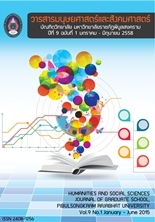การพัฒนาตัวบ่งชี้คุณลักษณะการอยู่ร่วมกันตามวิถีประชาธิปไตยของนักเรียนระดับชั้นประถมศึกษาปีที่ 4–6 สังกัดสำนักงานเขตพื้นที่การศึกษาประถมศึกษาพิษณุโลก เขต 3
Keywords:
พัฒนาตัวบ่งชี้, คุณลักษณะการอยู่ร่วมกันตามวิถีประชาธิปไตย, นักเรียน, Development Indicators, A Feature Based on Democratic Coexistence, StudentsAbstract
การวิจัยครั้งนี้มีจุดมุ่งหมาย 1) เพื่อตรวจสอบความสอดคล้องของโมเดลการวัดคุณลักษณะการอยู่ร่วมกันตามวิถีประชาธิปไตยกับข้อมูลเชิงประจักษ์ 2) เพื่อพัฒนาตัวบ่งชี้คุณลักษณะการอยู่ร่วมกันตามวิถีประชาธิปไตยกลุ่มตัวอย่างที่ใช้ในการวิจัยเป็นนักเรียนระดับชั้นประถมศึกษาปีที่ 4–6 สังกัดสำนักงานเขตพื้นที่การศึกษาประถมศึกษาพิษณุโลกเขต 3 จำนวน 443 คนซึ่งได้มาจากการสุ่มแบบแบ่งชั้น เครื่องมือที่ใช้ในการวิจัยเป็นแบบสอบถามมาตราส่วนประมาณค่า 5 ระดับจำนวน 49 ข้อครอบคลุม 3 องค์ประกอบได้แก่องค์ประกอบด้านการเคารพองค์ประกอบด้านความสามัคคีองค์ประกอบด้านการมีปัญญาสถิติที่ใช้ในการวิเคราะห์ข้อมูลได้แก่ค่าเฉลี่ย () และส่วนเบี่ยงเบนมาตรฐาน (S.D.) การวิเคราะห์คุณลักษณะการอยู่ร่วมกันตามวิถีประชาธิปไตยใช้โปรแกรม SPSS for WINDOWS และวิเคราะห์องค์ประกอบเชิงยืนยันโดยใช้โปรแกรม LISREL
ผลการวิจัยพบว่า
1. ผลการวิเคราะห์องค์ประกอบเชิงยืนยันด้วยโปรแกรมลิสเรลพบว่าโมเดลมีความสอดคล้องกลมกลืนกับข้อมูลเชิงประจักษ์พิจารณาจากค่าไค-สแคว์สัมพัทธ์ (2 / df) มีค่าเท่ากับ 1.10 ค่า P-value เท่ากับ 0.30 ค่าดัชนีวัดระดับความกลมกลืน (Goodness of Fit Index: GFI) มีค่าเท่ากับ 0.98 ค่าความคลาดเคลื่อน (Root Mean Square Error of Approximation: RMSEA) มีค่าเท่ากับ 0.015 ค่าดัชนีวัดระดับความกลมกลืนที่ปรับแก้แล้ว (Adjusted Goodness of Fit Index: AGFI) มีค่าเท่ากับ 0.97
2. ผลการศึกษาคุณลักษณะการอยู่ร่วมกันตามวิธีประชาธิปไตยของนักเรียนระดับชั้นประถมศึกษาปีที่ 4-6 พบว่าประกอบด้วย 3 องค์ประกอบซึ่งมีค่าน้ำหนักองค์ประกอบมาตรฐานเรียงลำดับค่าน้ำหนักองค์ประกอบมาตรฐานจากมากไปน้อยดังนี้องค์ประกอบด้านความสามัคคีองค์ประกอบด้านการเคารพและองค์ประกอบด้านการมีปัญญาเท่ากับ 0.98, 0.97 และ 0.89 ตามลำดับ
A Development of Indicators of Democratic Living for Student in PrathomSuksa 4-6 under Phitsanulok Primary Educational Service Area Office 3
The objectives of this study were 1) to verify the validity of the model of democratic living characteristics measurement against empirical data, 2) to develop and verify the quality of the indicators of democratic living of students. The participants were 443 students in Prathomsuksa 4-6 under Phitsanulok Primary Educational Service Area Office 3, selected through stratified random sampling technique. The instrument used was a five rating scale for democratic living of 49 items. The questionnaires composed of 3 aspects: The respect, The Unity and The intellect. The data were analyzed by mean, standard deviation, coefficient of variation, skewness and kurtosis by using SPSS for WINDOWS and the confirmatory factor analysis were analyzed by LISREL program.
Results of this research were the follows:
1. The result of confirmatory factor analysis by using LISREL program, showed that the resulted model fitted the empirical data The construct validity of models was consistent with empirical data with relative chi-square :2/df=1.10, P-value = 0.30, Goodness of Fit Index (GFI)=0.98, Root Mean Square Error of Approximation (RMSEA)=0.015 and Adjusted Goodness of Fit Index (AGFI)=0.97.
2. The characteristics indicating democratic living consisted of three factors, Respect, Unity and Intellect. There three factors in the characteristics indicating democratic living, i.e. ethics, the unity, the intellect and the respect ranging from the highest factor loading value to the lowest were 0.98, 0.97 and 0.89 respectively.
Downloads
How to Cite
Issue
Section
License
บทความหรือข้อคิดเห็นใดใดที่ปรากฏในวารสารมนุษยศาสตร์และสังคมศาสตร์ มหาวิทยาลัยราชภัฏพิบูลสงครามเป็นวรรณกรรมของผู้เขียน ซึ่งบรรณาธิการไม่จำเป็นต้องเห็นด้วย บทความที่ได้รับการตีพิมพ์เป็นลิขสิทธิ์ของวารสารมนุษยศาสตร์และสังคมศาสตร์ มหาวิทยาลัยราชภัฏพิบูลสงคราม







